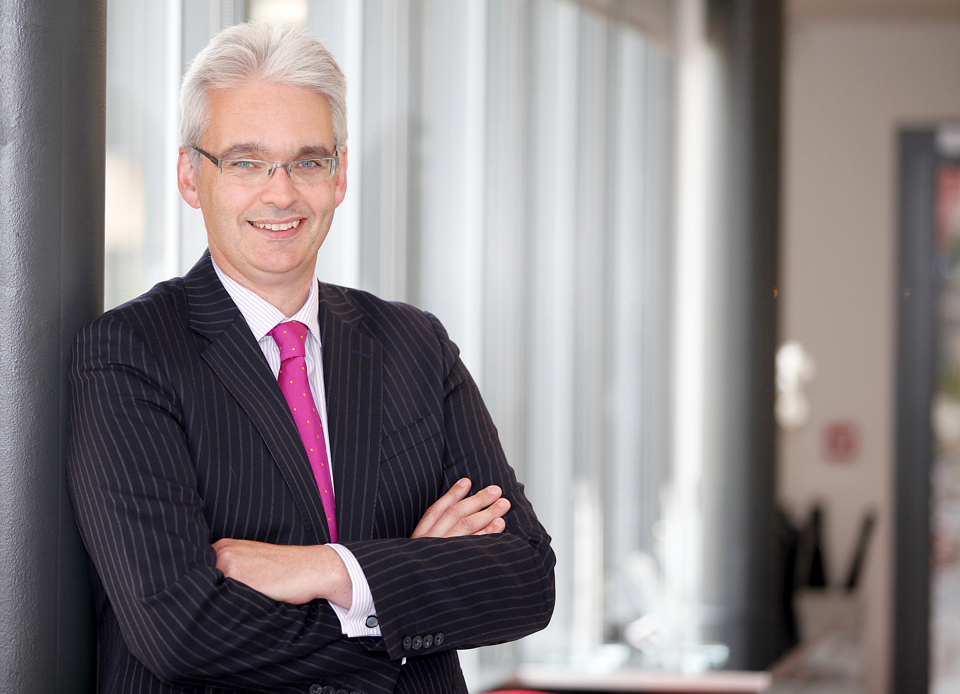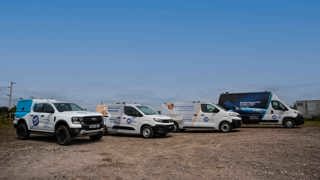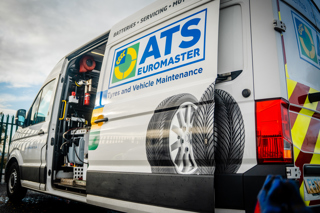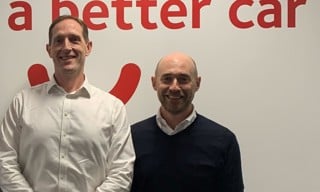Novuna Vehicle Solutions returned to winning ways in 2024 after scooping the Fleet News Award for leasing company of the year (more than 20,000 vehicles), sponsored by Jaama.
It reclaimed the title lost in 2023 after a run of four consecutive victories, to the evident delight of managing director Jon Lawes (pictured).
“Winning Leasing Company of the Year is a tremendous and powerful badge to wear for us,” he said. “I’m very proud of our Novuna team for their hard work and dedication to solving our customers’ challenges. Seeing their efforts recognised with this award is a real motivator for our colleagues now and for those looking to join us in the future.”
It came off the back of the company’s most successful year yet in the UK, with a 20% increase in car customers and 27% growth in vans – the latter maintaining Novuna’s emphasis on fleets where compliance and uptime are priorities, such as home delivery, utilities, infrastructure and public sector.
The combined funded and managed fleet size now sits at just over 110,000 assets (95,000 funded only) covering every facet of fleet: 55,680 cars, 45,258 vans, 1,793 heavy vans, 4,607 trucks and 2,947 plant/trailer.
It even leases e-bikes, although demand in the UK is limited.
“Our success is down to having a clear strategy on sustainability, customer experience and digitalisation,” Lawes said.
“We have also worked hard to get cars, vans and trucks working as one proposition – our total asset solution.”
Beyond wheels to chargers
The strategy also extends beyond assets with wheels as part of Novuna’s aspiration to be the “market leader in sustainability solutions”.
It manages 300 chargers across its client workplace estate with a target of getting to 1,000.
Solutions encompass workplace to home, solar to battery storage, all managed in-house by Novuna’s innovation team, headed by EV guru Johnny Berry.
“We think of the charger like any other asset, so we manage the uptime, and we manage the service to repair as soon as possible,” said Lawes.
“This is a priority for operational fleets.”
Current uptime is 98.5% across the entire charging network, with every unit checked once or twice per year depending on the maintenance contract and constantly monitored for any dips in performance.
Such is the importance of this new charging business that both the sales and innovation teams report to Novuna deputy managing director Lucy Line.
Lawes added: “Our purpose is to help customers solve their problems and their biggest challenge is charging.”
Last year, Novuna opening its own EV charging forecourt at its head office in Trowbridge which has four rapid charge 100kW DC bays and 12 22kW AC bays, powered by a combination of solar energy and grid connection and assisted by a 180kWh battery storage facility.
Its purpose is to provide a proof-of-concept testbed for learning and new ideas, one of which will see the site open to the public, from September.
“We want to show our customers that you can monetise your chargers by making them available to the public,” Lawes said.
“It also gives something back to society.”
Shared networks concept
The trial is part of a three-pronged strategy to create shared charging networks.
Novuna is also working on a virtual depot concept that will enable customers to share their chargers with other businesses. It is working on the charge point management system and security management, and is confident it will launch before the end of this year.
Lawes said: “We just need the agreement of one or two large customers to get it moving and then build on it. We are speaking to customers now who agree in principle and want to work with us to find a solution. By the end of 2024, we will have the technology and back office to facilitate it.”
The third initiative is to establish a private network scheme whereby drivers without home chargers can utilise a near neighbour’s charger, making money for the owner.
Lawes calls it an “Airbnb for chargers”.
“We will have solved all these by 2025, which is especially important for commercial vehicles,” he added. “They can generate profit for the charger owner but still be cheaper for the charger user than a public option.”
Novuna’s total asset solution proposition has contributed to growth across all parts of the business, including its full risk indemnity salary sacrifice scheme, which now accounts for 20% of the corporate funded car fleet.
Most are full battery electric vehicles (BEVs).
“We are also winning company car business as well,” Lawes said. “It was an area that we wanted to improve which has seen a rebalancing within cars.”
BEVs account for 27% of Novuna’s car fleet, emphasising the vital role that leasing companies are playing in the transition to electric, not least with car manufacturers desperately trying to achieve the 22% ZEV Mandate target this year.
However, like its rivals, Novuna is having to cope with a dramatic drop in residual values for electric cars, which shows no signs of abating.
“Every leasing company will be losing money on BEVs because of the residual values but you have to have the long-term vision and strategy to carry on,” Lawes said, adding sanguinely: “Nothing worth having is easy.”
With the General Election weeks away, Lawes would like to see a firm commitment by the next Government to support the used BEV market.
“All the support is at the beginning, but if this market is going to work, it has to be evenly spread out,” he said.
“Leasing companies give access to well-maintained vehicles to all parts of society, but BEVS are currently only available to certain parts. We have to work with Government to make them available to everyone.”
He believes the Conservative Government’s decision to push back by five years to 2035 the ban on the sale of new ICE cars and vans has dented demand among consumers and SMEs – although a Labour Government has pledged to reverse the decision (as have the Lib Dems) – but it hasn’t altered the transition plans of medium to large fleets.
Decarbonised fleet by 2030
It also hasn’t affected Novuna’s own vision to decarbonise all its funded cars and light commercials up to medium panel vans by 2030. Its electric LCV fleet currently sits at 12% (not including SMEs).
Decarbonise is a key work here as Lawes stresses Novuna is fuel agnostic.
This year, the company joined the DfT-funded Tees Valley Hydrogen Vehicle Ecosystem (HYVE) consortium, where it works alongside German manufacturer Quantron to build, finance and manage hydrogen fuel cell trucks provided to fleets.
The project will deploy 25-30 hydrogen HGVs ranging from 4.2 to 27 tonnes.
“We are also looking at CNG and LNG for HGVs which we think is another answer,” Lawes said.
“It’s all about the right fuel for the right application: electric is good for urban environments; hydrogen is the choice for longer journeys.”
Interestingly, Novuna is able to reconvert the CNG tanks to hydrogen which minimises cost as part of a fleet’s decarbonisation roadmap.
While proclaiming not to “obsess” about fleet size, Lawes does have an ambition to become a top five FN50 leaseco within five years (it is currently sixth). It will require a significant increase – Lawes estimates around 150,000 vehicles - with fifth place currently occupied by Alphabet with a funded fleet of almost 131,000 vehicles.
He said: “We didn’t lose one customer last year and this is what I am more worried about – are we retaining customers?
“We don’t always get it right, but our culture is to learn and work to get it right the next time.”
Voice of the customer
Novuna’s ‘Voice of the Customer’ initiative casts a spotlight on other areas which can be improved.
It interviewed 50 customers at the end of last year and has already been a catalyst for change, with Novuna separating out incident management from downtime management to create a new dedicated team.
“We want every colleague to be put in the eyes of the customer, for example, to understand what it really means when they have a vehicle off the road,” Lawes said.
“We also have customer fleet managers who catch any issues and resolve them before the customer does.”
Allocating more resource to tackle downtime, as well as improve its internal processes, has enabled Novuna to reduce average vehicle off road times from 12 to seven days.
Its target for planned maintenance is two days; for unplanned work, it aims to get the vehicle back on the road within five days.
Peer-to-peer benchmarking via Novuna’s Fleet Maturity Index helps to highlight any shortcomings within an individual customer’s fleet, for example average damage versus similar profile fleets.
It can then share policies to lift performance, supported by its account management and consultancy teams.
“Communication is key,” Lawes said. “If there is an issue, you can’t have the customer chase you; we have to be proactive with our communications.”






















Login to comment
Comments
No comments have been made yet.